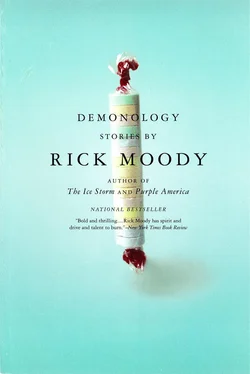— Gerry. Wait. Don’t you want to see it?
Dinah Polanski. The book. He’d almost forgotten. How quickly attachments came and went. Dinah had been scouring the east wall of the den, a small section of hardcovers, looking for her title. Now she had it. She was waving it like it was an illuminated spiritual text. She would bring the message to the people, though the people had shown that they were much more interested in yeast, fermentation, hunks of mutton, swords.
— Just a second, Dinah!
He leaned over the sleeping form of Sally Burns, for her identity was now apparent, Sally, who wore nondescript corduroys and a pink turtleneck sweater. Shewas blond. Didn’tthe Anglo-Saxons turn out any girl children who were not blond? A tiny strand of drool, like a synthetic fiber, fresh from its vat of plastics, stretched from her lips. With an index finger, Gerry interrupted this circuit of drool connecting lip and chintz throw pillow so that the moisture instead coiled around his index finger. He put this finger to his own lips, and the liqueur of Sally Burns’s mouth was now upon his own. Her drool tasted like bubblegum. And celery. He composed the following love lyric, Ialways thought you were really good in that mock debate that we had in history on the subject of abortion and I was proud that you supported a woman’s right to whatever it was you were supporting, but I didn’t say anything to you about it, because I’m just some guy. It’s not my right to choose. I support a guy’s right to get the hell out of the way when a girl has a decision she’s going to make. It was kind of you to let me do the cross-questioning of that one ninth grade kid and it was great when he was so frustrated that he turned red. If you ever wake up, be sure to remember that I had all these compassionate thoughts about you. Sally Burns’s friend, Dee Maguire, was laid out parallel, in the opposite direction, head to Sally’s feet, one hand draped over Sallys hips. Gerry had never seen anything so beautiful in his life, and yet gazing upon it he suddenly felt like a shoplifter, and so he made his way around the end of the divan, and from there toward the door to the pantry.
— Gerry!
— All this nonsense about our having come to the end of a consumer society! Mr. Foster thundered. — It’s industry that has made this great nation what it is. Take the Panama Canal, a good example, and why we should have to —
Meanwhile, on the television screen in the den, the white square went back and forth and back and forth and back and forth.
Nick Foster probably had imagined a party in which lots of mischief was accomplished to the detriment of neighbors near and far, such that adult males of Darien would, in a collective rage, climb stepladders fetching down the toilet tissue from the willows and forsythia and dogwoods, all the next day, while their wives worked over the outsides of the french windows with a bucket of water and a scrub brush. Yet this vision would never come to pass. The materiel for Halloween’s fiendish assault on norms and standards was still stacked on top of the countertops in the pantry. There were three or four cartons of toilet paper on the floor, two dozen cans of Noxema mentholated shaving cream, a box of Ivory soap bars. Gerry also noted that the Fosters possessed a number of sets of china, not just one set, but two or three, including stuff that looked old and hand-painted, perhaps in an Asian country where the folk arts flourished until recently.
He then stuck his head inside the kitchen, which was porcelain, magnificent, and spotless. A young black woman sat, reading a hardcover at a breakfast table. She paid no attention to Gerry, as if it were rude to pay attention to him, as if any interaction would be rude, and he knew, from experience, that he likewise was intended to be neglectful of this black woman, this staff person. This was just the kind of thing that they did here. This was the way the system worked. Its what she expected, it’s what her employers demanded.
— What’s it like working for the Fosters?
— Beg pardon?
— Working here. For the Fosters.
— What are you talking about?
— Just asking.
— You should mind your own business. Her voice diminished to a whisper. — Don’t you worry about what goes on in somebody’s house. You wouldn’t understand anyhow.
— No, I would understand.
The black woman waved him off.
— I don’t have time for nonsense.
He would have pursued his convictions, but beyond Gina the cook’s fiefdom of particulars, he could see someone in the laundry room. A girl. A beguiling and comely someone. Girls, from a distance, and the heartbreaking recognition of their superiority to boys, their fleeting perfection, the curve of them in jeans, the strap of a bra peeking out of a V-neck sweater, smudged eyeliner; there was nothing more perfect than that smudge of eyeliner; a sobbing girl (perhaps disconsolate over some brutality of the world, the starvation of distant children, the local athlete with his neck broken); weeping girls; disheveled girls; girls at dusk; girls in autumn; girls running; girls laughing; girls growing up. Here was a girl, mostly concealed in a luffing of white sheets, bleached and dried, sheets in the process of being folded. What a relief from the tense atmosphere of the kitchen, from the Victorian stiffness of the parlor. This girl was trying to fold king-sized sheets, twice again as wide as she was, longer than she was. She was dressed in white corduroys, and a white velour turtleneck sweater, and so she was a vision of simulated virginity and piety. Polly Firestone. The mere syllables of her name summoned nobility. She could purchase multiple sets of new sheets if she wanted. And yet where on another day he might have resented it, the way in which the name Firestone summoned nobility, the way in which the name Abramowitz sounded like a name for a manufacturer of carpets. Nevertheless, there was a pathos to Polly’s travails in the laundry room. Despite her inability to manage the king-sized sheets, she didn’t seem at all resentful. In fact, she was radiant, and lit in profile, across planes of cheekbones, by candlelight, by a pair of hatless jack-o’-lanterns on a shelf with the powdered detergents. Polly Firestone, in a flattery of candlelight, resembled the heavenly servant girls of Flemish painting, and her every movement summoned the music of zithers from a heavenly bank of cumulonimbus clouds. There was a stack of a dozen sheets already piled on the dryer, folded in a number of oblong and imperfect ways. Now, as Gerry watched, Polly turned her attention to that most vexatious of folding responsibilities, the fitted sheet. Would the young heiress, of the Philadelphia Firestones, know the proper way to fold a fitted sheet? Would she at least be able to argue for the proper strategy in folding this sheet, having been informed through some matri-lineal ritual that Gerry’s mother would eventually write about for the Cultural Anthropology Quarterly, in a monograph that would include a note saying, Jane is not the subject’s real name. It has been changed at the insistence of her family. Would Polly jam the fitted sheet up into a ball, as the vast majority of Americans had been doing for almost fifty years now, proving that class difference was not as rigid as it had once been? No, Gerry Abramowitz divined: Polly had known the theory of folding since birth.
— Hi there. Polly Firestone said, without looking up. — Aren’t you a little late?
He manufactured the appropriate ennui. Boys of Darien avoided caring perceptibly about anything, the trajectory of that revolving plastic disk that was about to float into their hands, chased by a golden retriever. It was routine. Everything was routine. Boys could walk across a festooned gymnasium into the arms of a girl at a dance as though it were like getting the mail. Without evident feeling. He would attempt these skills, though they were foreign to him.
Читать дальше












